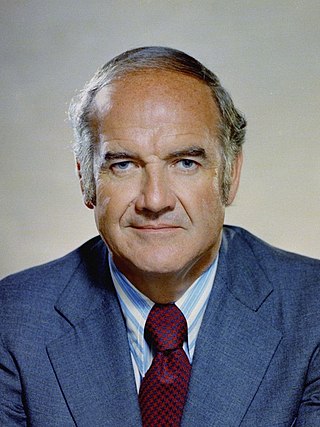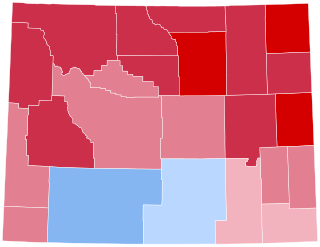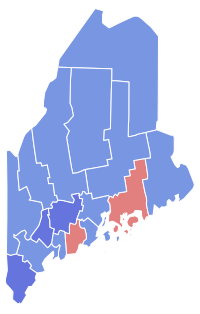
The 1972 United States presidential election was the 47th quadrennial presidential election held on Tuesday, November 7, 1972. Incumbent Republican president Richard Nixon defeated Democratic U.S. senator George McGovern in a landslide.

Edmund Sixtus Muskie was an American statesman and political leader who served as the 58th United States secretary of state under president Jimmy Carter, a United States senator from Maine from 1959 to 1980, the 64th governor of Maine from 1955 to 1959, and a member of the Maine House of Representatives from 1946 to 1951. He was the Democratic Party's candidate for Vice President of the United States in the 1968 presidential election.
Donald Henry Segretti is an attorney best known for working as a political operative with then-U.S. President Richard Nixon's Committee to Re-elect the President during the early 1970s. Segretti served four and a half months in prison after investigations related to the Watergate scandal revealed his leading role in extensive political sabotage efforts ("ratfucking") against the Democrats.

The Canuck letter was a forged letter to the editor of the Manchester Union Leader, published February 24, 1972, two weeks before the New Hampshire primary of the 1972 United States presidential election. It implied that Senator Edmund Muskie, a candidate for the Democratic Party's presidential nomination, held prejudice against Americans of French-Canadian descent.
The Maine Democratic Party is the affiliate of the Democratic Party in the U.S. state of Maine.

Clinton Amos Clauson was a Democratic Party politician and the 66th Governor of Maine. Clauson died while in office, having served as governor for just under a year.

From January 24 to June 20, 1972, voters of the Democratic Party chose its nominee for president in the 1972 United States presidential election. Senator George McGovern of South Dakota was selected as the nominee through a series of primary elections, caucuses, and state party conventions, culminating in the 1972 Democratic National Convention held from July 10 to July 13, 1972, in Miami, Florida.

The 1958 Maine gubernatorial election took place on September 8, 1958. Incumbent Democratic Governor Edmund Muskie, was term limited and seeking election to the United States Senate, thus did not run. Democrat Clinton Clauson, then mayor of Waterville, unexpectedly defeated Muskie's chosen Democratic candidate in the primary, and faced off against the popular previous two term Republican Governor, Horace Hildreth in the general election. Hildreth was the heavy favorite to win, however Clauson was able to narrowly defeat him, retaining the Blaine House for the Democrats.

George McGovern, a Democratic Party politician from South Dakota, was first elected to the United States House of Representatives to represent South Dakota's 1st congressional district in 1956. He was re-elected in 1958, before making an unsuccessful run for the United States Senate in 1960 against Republican incumbent Karl Earl Mundt. After serving in the John F. Kennedy administration as director of the Food for Peace program, McGovern ran again for the Senate and narrowly prevailed over appointed Senator Joseph H. Bottum. In 1968, McGovern unsuccessfully sought the Democratic Party's presidential nomination at the Democratic National Convention and was re-elected to the Senate over former Governor of South Dakota Archie M. Gubbrud. In 1972, McGovern was successful in his campaign for the Democratic presidential nomination, but lost the election in a landslide to incumbent President Richard Nixon. McGovern was re-elected to the Senate in 1974 over Vietnam War veteran Leo K. Thorsness, but lost re-election in 1980 to then-U.S. Representative James Abdnor. McGovern made a final unsuccessful run for president in 1984 United States presidential election.

The 1958 United States Senate election in Utah was held on November 4, 1958.

Jane Frances Muskie was an American civic leader and writer who, as the wife of Edmund Muskie, served as First Lady of Maine from 1955 to 1959. She was an active campaigner for her husband, supporting his political career on both state and national levels while he served in the Maine House of Representatives, as Governor of Maine, as a United States senator, and as Secretary of State. During the 1972 United States presidential election, she was accused in the Canuck letter, a forged letter reportedly written by Donald Segretti and Ken W. Clawson that was published by William Loeb III in the Manchester Union Leader, of being "racially intolerant", a "drunkard", and using colorful language on the campaign trail. Her husband publicly rebuked the letter, calling Loeb a "gutless coward" in an emotional display that ultimately lost him the 1972 Democratic Presidential Primary. Muskie later spoke about the incident with her husband in an interview with The New York Times in 1986, saying that "now it's quite acceptable for a man to show his emotions.. President Reagan does it all the time."

The 1976 United States Senate election in Maine took place on November 2, 1976. Incumbent Democratic senator Edmund Muskie won re-election to a fourth term.

The 1968 United States presidential election in Massachusetts took place on November 5, 1968, as part of the 1968 United States presidential election, which was held throughout all 50 states and D.C. Voters chose 14 representatives, or electors to the Electoral College, who voted for president and vice president.

This article lists those who were potential candidates for the Democratic nomination for Vice President of the United States in the 1968 election. After winning the Democratic presidential nomination at the 1968 Democratic National Convention, incumbent Vice President Hubert Humphrey asked the convention to nominate Maine Senator Edmund Muskie as his running mate. The convention overwhelmingly voted to ratify the choice of Muskie, though Julian Bond picked up a scattering of votes. Muskie was surprised by the selection, as he was from a Northeastern state with few electoral votes. Humphrey almost chose Oklahoma Senator Fred R. Harris, but Humphrey decided that Muskie's age, governmental experience, and quiet temperament made him the better candidate. The Humphrey–Muskie ticket ultimately lost to the Nixon–Agnew ticket in the 1968 election. Muskie's place on the national ticket helped make him an early front-runner for the 1972 Democratic presidential nomination, though Muskie ultimately dropped out of the contest.

The 1958 United States Senate election in Maine was held on September 8, 1958 to elect a United States senator. Incumbent Republican Senator Frederick G. Payne lost re-election to a second term.

The 1964 United States Senate election in Maine was held on November 3, 1964. Incumbent Democrat Edmund Muskie was re-elected to a second term in office over Republican U.S. Representative Clifford McIntire. This was the first senate race for this particular seat in which the election was held in November and not September.

The 1970 United States Senate election in Maine was held on November 3, 1970. Incumbent Democrat Edmund Muskie defeated Republican nominee Neil S. Bishop with 61.74% of the vote.

The 1968 United States presidential election in Wyoming took place on November 5, 1968. All 50 states and the District of Columbia were part of the 1968 United States presidential election. State voters chose three electors to the Electoral College, who voted for president and vice president.

The 1968 United States presidential election in Arizona took place on November 5, 1968. All fifty states and the District of Columbia were part of the 1968 United States presidential election. State voters chose five electors to the Electoral College, who voted for president and vice president.

Willis Allen Trafton Jr. was an American politician and lawyer from Maine. A Republican from Auburn, Maine, Trafton served in the Maine House of Representatives and was its Speaker from 1955 to 1956. He was a lawyer, with degrees from Yale University and Harvard University (1947). He also was the Republican nominee for Governor of Maine in the 1956 Maine gubernatorial election.




















